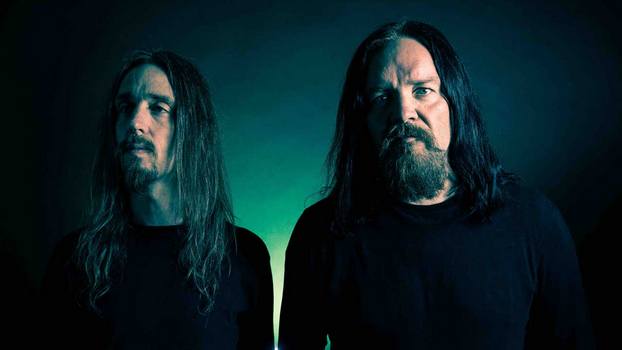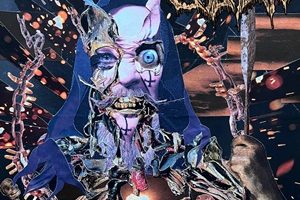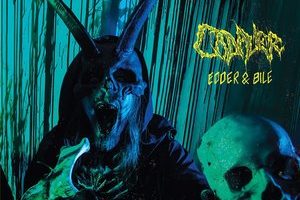Cadaver – Passion for the Extreme
Sunday, 22nd November 2020
There’s been a few iterations of Cadaver over the years, since the beginnings of death metal, and the most recent incarnation has stemmed from mainman Anders Odden joining forces with drummer Dirk Verbeuren (he of Megadeth, and a number of others through the years). The pair revel in raw, aggressive death metal, and with an earlier EP already this year, a quick return to the band’s latest full-length, Edder & Bile. Having chatted with Anders last time for the EP, we reached out to Dirk to get his side of the story about Cadaver’s latest, and his connection to the act over the years. We also spoke with him about his passion and excitement for music, working with a varied group of people on projects, and what’s coming up in his near future.
Dead Rhetoric: What initially drew you to get involved with Cadaver?
Dirk Verbeuren: Cadaver was a band that really stood out to me growing up. I listened to a lot of stuff during that era when Hallucinating Anxiety came out and the story, as I recall it, a good friend of mine and I would go to the record store and spend the little amount of money we had discovering new bands. This was obviously pre-internet. We would just buy stuff that looked cool, evil, or brutal [laughs]. My friend bought the Cadaver tape, and that’s how I got to know it. It just stood out to me with the crazy tuba intro and the weird, unique sound that they had. It became a legendary album for me.
Many years later, when I was filling in for Satyricon in early 2014 – I did a few shows with them and the 70,000 Tons of Metal Cruise. I had no idea that Anders Odden, one of the main men in Cadaver and one of the founding members, was also playing bass in Satyricon. When I found out it was him, I was so stoked. We got to talking, and he said that he had been recording some demos and songs here and there. He asked if I would be interested in reviving the band, so of course I was in!
Dead Rhetoric: It’s cool that you have that sort of history, being a fan and then being able to help revive them. It’s a unique situation.
Verbeuren: Totally, and I saw them throughout the years too. I never saw them during the early, early days because I lived in Paris at the time and if they played there I missed it. I did see them later on, when Cadaver Inc was around. That show was really cool – they were opening for Mayhem if I remember correctly.
That was around the time when they had the crime scene clean-up website and the little business cards. I remember picking up an Anders Odden, CEO of Cadaver Inc business card, and going to the website and thinking, “What the hell is this thing [laughs]?” It was such a brilliant PR idea, and it even made the headlines in Norway [laughs]! People thought it was real! It was like, ‘how many people have you killed, how many corpses are there – we will come clean them up,’ you fill out a form on the website. It was really brilliant.
Dead Rhetoric: How do you describe Edder & Bile, from your perspective?
Verbeuren: To me, it’s a link to the past. I wanted to approach it, when I talked with Anders, in a way to how I perceived the band as well. Of course, it’s first and foremost his project and band, and he’s always been a part of it. So I didn’t want to impede on his vision either. But we both kind of agreed that there’s a certain rawness and spontaneity that comes with all eras of Cadaver. So we really went into it and just went with the flow. We didn’t plan things ahead too much. I purposely didn’t plan my drum parts too much. We recorded together, instead of separately, with no click track. There were a couple of songs with a click track, but most were not. It was just mean on drums and Anders on guitar, just jamming until we had a good take. As we jammed, somethings would evolve. It was really an organic approach.
For me, that’s how I experienced Cadaver when I was younger, and that’s how I kind of see death metal. Death metal should be something that’s a little untamed. Of course, there are different takes on it, and I’m not dissing any other approach to death metal because music is art – everything is allowed and the result is cool. But for me, I enjoyed that – it was really around in the late ‘80s. The same goes for thrash metal and other underground styles. People were just going for it. You can hear that a lot on the first couple of Megadeth albums too. It was just total madness, playing super fast and just ripping through the songs. So that’s my take on Edder & Bile. I’m glad it came out the way it did, because I think that feeling is there.
Dead Rhetoric: This release comes after the EP earlier this year, do you feel it was successful in getting the band’s name around a bit before the full-length? I know that in speaking with Anders a few months back, he wanted to do the opposite until the quarantine started.
Verbeuren: Yeah, that’s exactly true. It turned out to be a blessing that it happened the other way around. The EP got good attention and it was kind of a taster. I think it got people excited for the album. Sometimes it’s like that, and plans get messy and then you are like, this was a better idea all along. I’m stoked about it. I thought the EP was really killer. They were just songs that we thought were more on their own. It wasn’t because we thought they were less good than the ones on the album, it just felt like those songs worked well together and the album didn’t need to be longer. It gives people more stuff to have. Personally, I’m a huge fan of vinyl and the fact that there’s a limited edition of the record that comes with a bonus 7” is awesome, like the Grindcrusher compilation! That’s like my youth right there!
Dead Rhetoric: You were talking about death metal and having that untamed quality. You really shouldn’t have a 45-50 minute length thing. It should be short and to the point – just put the hammer down!
Verbeuren: Exactly. Again, there will be albums that contradict that because if you make a really good one hour album, then it’s a really good one-hour album. For us, it was a ‘punch in the face’ kind of statement. With ten songs and a little over a half hour of that, it’s usually time to listen to something different for switch gears. At least for me, I mean when I was in my early teens and twenties, I could listen to death metal all day long. Nowadays, I like to switch things up a little more. It keeps things fresh and that’s how we looked at it. The tracklist was something that we took a lot of time to get right. Luckily Anders and I saw eye to eye on it, we have a very organic collaboration and that makes it a lot of fun.
Dead Rhetoric: What excites you about old school death metal from a drumming perspective?
Verbeuren: One of the most exciting things to me is to be able to let loose. Nowadays, most songs and albums are recorded to a click track. For obvious reasons, it makes work for the producer and engineer so much easier and it’s easier to build a songs structure that way. Many songs are built with a click track and then you keep those scrapped guitars as you record as a drummer. A lot of bands play with a click live. In Megadeth we play to a click live because we have videos matched up with the songs. We can’t just have a song be 30 seconds shorter all of a sudden, because I’m excited and playing fast. The same with Soilwork. It wasn’t everything, but we played a lot of songs to a click.
So to get back to your question, what excites me about this is to be able to let the songs breathe and be what they are on their own. When we were in the studio, there was a lot of back and forth with Anders and discussing how to change songs around – go full out, or be heavier, or faster. If you look at the tempos of the songs, they are probably all over the place, but I’m guessing that it’s how I naturally play, and how Anders and I naturally play together. That’s part of the identity of the band.
Unfortunately, that’s something you tend to lose a bit of when you have a click track. Good musicians are able to make it work – I play to a click all the time and you try to make it as organic as you can. But to be freed of that is a good thing for me. I enjoy it a lot. It puts more pressure on me to play well [laughs]! You can’t just hear the tempo and follow – you have to do it yourself and do it right. It’s more difficult, but at the same time, it’s also what keeps the vibe of the album. This raw and organic intense vibe. The drums are a big part of that. In death metal, drums are in my opinion, a huge part of what makes or breaks a record. It was really important to me.
Dead Rhetoric: How do you balance time with all of the bands that you are currently involved in?
Verbeuren: [Laughs] Megadeth is the priority obviously. The plan was that we were going to be touring a lot this year. Like over half of the year. That’s not happening because of the pandemic, but that said, the Cadaver album was recorded last year. When I have down time, I have to keep busy. It’s not like a have a choice. But I also enjoy staying busy and working on cool projects. With Cadaver as an example, Anders is very well aware that I have Megadeth, so he has a backup drummer who is ready to jump in if there is anything I can’t do. He actually had a lot of tours planned with Cadaver and he knew I couldn’t do most or all of them, because of the Megadeth schedule. He’s okay with that.
Anders is fine if I end up doing the records and maybe a show here or there. If I’m lucky, maybe I’ll get to do a tour. But that’s okay with him, with working around my schedule, since we have such a good connection and come from the same place. We just have a blast together and enjoy the same type of music, so it makes sense in a way. It’s always a case by case thing that you do. Sometimes it works out, sometimes it doesn’t, but a lot of the projects that I am involved in don’t have many plans for playing live, at least that I know of. I think most people, when they start working with me, knowing that I’m in Megadeth and that’s the biggest band I’m in – they know what they are getting into [laughs].
Dead Rhetoric: What do you feel is the greatest benefit of drumming in a number of varied types of metal bands?
Verbeuren: That’s exactly it. It’s all those differences that keep me on my toes. Every project is its own beast, so I’m always pretty dedicated to finding my role in there. That role is always different, and it gets done in its own way – each role requires a unique approach. That’s actually what I enjoy. When you work with different people on a different set of songs or different ideas, it’s evolving as you go. I think, for me, is that it really builds confidence in my own craft. That’s something I struggled with a lot in my earlier years in being a drummer.
I could do what I did, but as soon as I deviated from that, I felt scared – that I wasn’t good or that I didn’t know what to do exactly. There was just some level of discomfort with that. Over the years, doing all these recording sessions, filling in live with people – last year I did a gig with Testament, a few gigs last minute with At the Gates, I’ve played with Satyricon in the past, and other bands – all of those you come in and just have to fill a role. People don’t want to hear Testament and all of a sudden hear a bunch of different drums. Those are classic tracks, and people want to hear them a certain way – just like Megadeth. It’s a very meticulous work that goes into preparing that, and making those performances good for them and their fans, first and foremost. That’s not stuff I do for me, in the sense that I get to do this and that. It’s about honoring the songs the way they are.
The same for Megadeth by the way. All those classic tracks have little details that people want to hear. My job is to do that well. Of course, I can inject my own swing and groove, and little ideas here and there but for the most part, I am respecting the original parts. That’s very different than going in with Cadaver, for example, and writing a bunch of songs and figuring out what I’m going to play on drums. Having that evolve in the studio, like we were talking about earlier. So having all of those things combined, it just makes me feel like a more confident drummer and more versatile. It increases my love for music too. The more comfortable you are in your instrument, the more fun you are having, the more you are able to really let loose and tap into whatever inspiration happens in the moment. That’s the best part of it, I love playing drums now more than ever!
Dead Rhetoric: That’s awesome. To be able to do it for so long and still have that youthful enthusiasm for it speaks to your character.
Verbeuren: Thank you, and youthful is the key word there. I think that music was so important and my escape and joy as a kid. It’s a way for me to keep my youth alive, to play music. That’s why it connects to me on a deeper level and why I am able to tap into something that I couldn’t explain. What happens when I sit down and get into the vibe/zone of a song and things come out on drums – it’s maybe something that I’m not even consciously thinking of, I can’t explain that, but I believe that’s what it is. It’s that connection to my youth. The years of innocence, and where you weren’t worried about this or that. You just did what you did [laughs].
Dead Rhetoric: Given your long list of bands that you have worked with or are working with, is there anyone that you’d love to work with at this point in a band or project?
Verbeuren: I’ve been really lucky in who I’ve worked with – Devin Townsend, Anders, the Napalm Death guys – there’s been so many! There’s also ones that I didn’t see coming at all, like Satyricon or At the Gates. It’s wonderful. I didn’t think, when I was 15 or 16 years old listening to all of these bands and music that I would be a part of this community the way that I am. You just don’t, as a shy 15 year old who struggled at making friends at school, it wasn’t what I envisioned. I always thought I’d be that shy 15 year old, and these people were so cool. They were doing all of this stuff!
Over the years, you meet them and they start knowing you. There’s this mutual respect that is a really wonderful thing about the metal community. Almost without exception, everyone that I have met that I looked up to has been super cool and down to earth. I have enjoyed having a short chat or picture with some, or even working with them on music. It’s a testament to the nature of metal. Especially in death metal. We might sing about all these brutal things, but in the end, we are all pretty cool people for the most part [laughs]!
Dead Rhetoric: What makes heavy metal your passion?
Verbeuren: The excitement that it brings me. I remember that so well when I heard it. I started out with Megadeth, Metallica, and Slayer – those early albums. I remember the first time I heard Peace Sells, Ride the Lightening, and Reign in Blood. The excitement that came out of that – I can’t really describe what it did to me. But at the time I was a skateboarder, and at the time, it just made me want to get on my board and do the craziest things, like go down a bridge at full speed. It just got me really pumped. There’s an energy to this music, and there still is. It’s the coolest thing. It’s not something that you can find in any other kind of music.
The same thing with Scum from Napalm Death. It was a hugely formative album for me. I didn’t understand it at first, and I wanted to return it to the store at first because I didn’t get it. Then it grew on me and it became one of my favorite records of all time. That was not an era where you could just hit skip [laughs]. You were stuck with your vinyl and you just spent 10 bucks, so you had to listen to it and give it some more chances [laughs]. But it’s the excitement! The heartfelt, intense, emotional vibe that comes out of those records. People can say, “Oh, what emotion is there? Anger.” But to me, it’s so much more than that.
One of my other favorite bands is Godflesh. They have some faster songs, but they wouldn’t be described by most people as brutal. But it comes from the same scene. There’s so much emotion in their music. I think it touches me, and it’s taught me to harness my own emotions and express them through music. I think its better to express a punch in the face through music than to actually punch someone in the face [laughs], it’s way better.
Dead Rhetoric: What plans do you have coming up with any of your bands?
Verbeuren: We are all in this unknown zone now. There are plans now for 2021, but who knows? I’m very much on the side of ‘let’s see if this stuff happens.’ But we are supposed to tour for Megadeth. There’s been a bunch of dates planned for the summer – July and August. The album is supposed to be coming out too, they are still working on the guitars but bass and drums are recorded. Dave will hopefully start on vocals soon. The album is going to be ready, not doubt about that, but when it will be released is going to depend a lot on what the global situation is. We are going to have to wait and see, and hopefully do the right thing in the meantime so things evolve in the right direction. This has been difficult to predict and control. You just have to wait and see.
When it comes to the other stuff, Cadaver was supposed to tour this year as well, and that’s obviously not happening. I have been busy teaching drums. Luckily I have a bunch of loyal students who are around every week and keep me afloat. I have been able to work on some other session stuff, and I have my own band, Bent Sea, which I have been working on when I have time. There’s a lot in the pipeline, and there’s been some songs released online. But we also have a full-length album in the works. It’s being recorded and mixed, and most of the recordings are finished. There are still some vocals to do, but the mixing process has actually begun on the finished songs. So there will be a Bent Sea album. I’m very fortunate that I’m able to still do music, working from home – something not given to a lot of people. I’m very aware of my privileges in this situation, and very thankful that I have been able to stay healthy, as well as my loved ones, and soldier on. That’s all we can do!

























